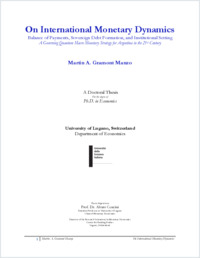On international monetary dynamics : balance of payments, sovereign debt formation and institutional setting : a governing quantum macro monetary strategy for Argentina in the 21st century
- Gramont Manzo, Martin A.
- Cencini, Alvaro (Degree supervisor)
- 2023
PhD: Università della Svizzera italiana
Macroeconomics
International monetary economics
Sovereign debt formation
Balance of payments
International payments
World monetary order
U.S. dollar
Financial crises
Quantum monetary economics
Argentina
English
This work addresses the existing international macroeconomic problem of sovereign debt formation in the global economy in general, and in Argentina in particular. This investigation dive into the nature of this problem, sustaining and explaining that it is a direct consequence of the lack of a proper system of international payments which would facilitate cross-border settlements using a neutral international means of payment under an international clearing house. The absence of such order produces strong exchange rate fluctuations, high currency volatility, and global imbalances, allowing the formation of financial bubbles followed by economic crises and collapse in the world economy, as seen in 2008. It is explained why, under the current monetary status quo, this process is bound to repeat itself. For developing countries, such as Argentina, this macroeconomic pathology is self-reinforcing and, therefore, degenerative of their macroeconomic conditions, blocking economic growth and human development. Additionally, for the current World international-liquidity provider, i.e., the United States, this monetary status quo embodies a self-defeating mechanism of a debt time-bomb that, sooner or later, will have to be deactivated, that is, a deleveraging process, which may trigger a major global debt crisis, impacting on the international status of the U.S. dollar, as well as on the world economic and financial stability, with unpredictable consequences. This research aims to, firstly, acknowledge this current international monetary pathology for both, emerging and developed countries (including the United States), understanding its genesis, nature, characteristics, and consequences. In order to attain the latter, a historical background will be presented, going back to the post Great War times in the 1920s, the Bretton Woods Conference in 1944, and the emergence of the pure fiat money big-flooding in 1971, identifying parallels from the past and recognizing the origin of the current problematic international monetary institutional setting. It will also present a brief theoretical framework to summarize a conceptualization and understanding of the macro-fundamentals underneath this macroeconomic monetary dynamic. Secondly, this work will propose specific structural and operational changes in the particular case of the monetary institutional arrangement of Argentina in order to neutralize this pathological dynamic until a comprehensive, global solution can be implemented. In this regard, it will be offered a novel monetary institutional architecture to be implemented into the Argentine central banking practices to provide a remedy for this macroeconomic problem. Moreover, this work will show that Argentine statistical data support the macro analysis and the policy proposal on which it is based, along with the theoretical and policy implications of the solution it advocates. Finally, some related epistemological and geopolitical considerations will be discussed, offering a brief geopolitical analysis focused on the existing currency statecraft trends, analyzing prospective international scenarios, and framing the Argentine strategic options. The macroeconomic theoretical framework applied in this work, as well as its pertained analysis, subsequent diagnosis, and ulterior proposed strategy, are based on the Quantum monetary macroeconomic approach initiated and developed by French economist Dr. Bernard Schmitt (1929-2014). All in all, this research seeks to make an original contribution to the ongoing debate among international monetary economic policymakers, practitioners, and scholars, in open economies in general, and in Argentina in particular. The ultimate purpose of this academic work is to understand how a healthy international monetary order should work and, in the case of Argentina, how a sound monetary and balance of payments management could be implemented to inhibit sovereign debt formation; encompassing, in this way, external and monetary stability, economic growth, and social progress.
- Collections
- Language
-
- English
- Classification
- Economics
- License
-
License undefined
- Open access status
- green
- Identifiers
-
- NDP-USI 2023ECO002
- ARK ark:/12658/srd1326722
- URN urn:nbn:ch:rero-006-121658
- Persistent URL
- https://n2t.net/ark:/12658/srd1326722
Statistics
Document views: 327
File downloads:
- 2023ECO002: 375
